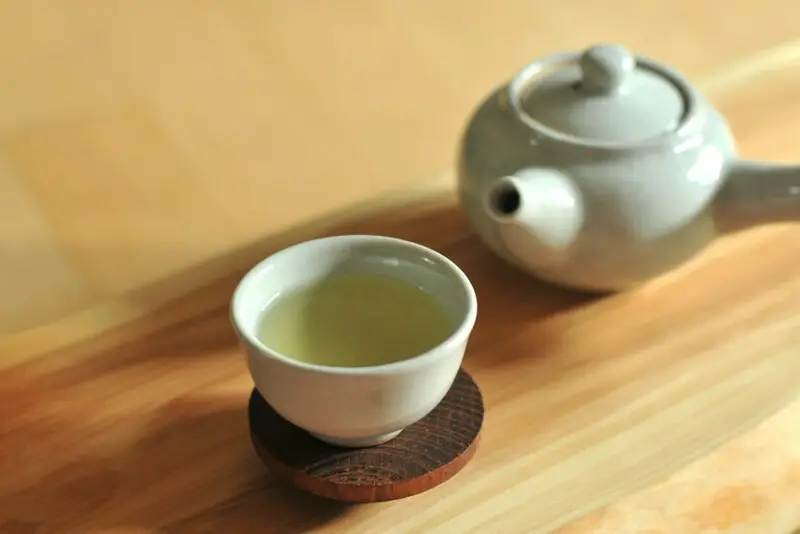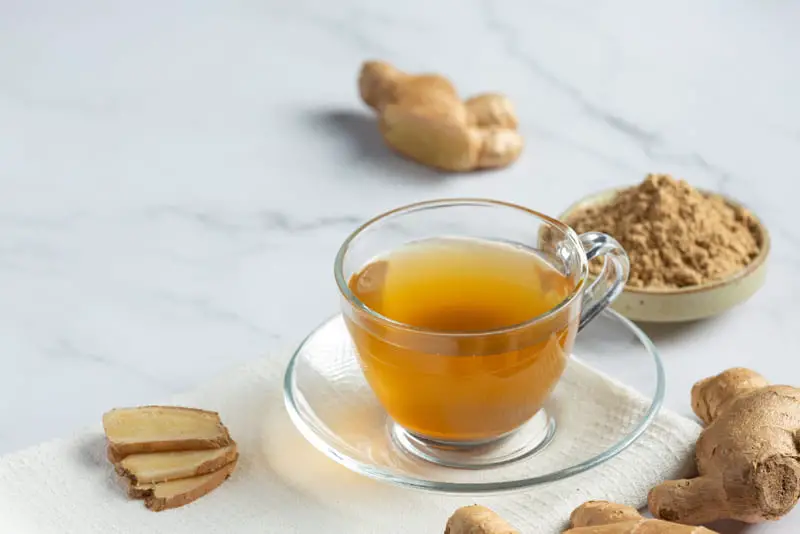Can you drink tea during intermittent fasting? This is one of the common questions people ask when starting their fasting journey.
While water is clearly allowed, many wonder if their daily cup of tea will break their fast. This is especially true for tea lovers who don’t want to give up their favorite beverage.
In this article, we’ll explore which teas are safe to drink during fasting. We’ll also learn how to enjoy them without breaking your fast. Let’s get started!
Table of Contents
- Can you drink during intermittent fasting?
- Types of tea
- Does black tea break a fast?
- Does green tea break a fast?
- Does matcha break a fast?
- Does herbal tea break a fast?
- Does ginger tea break a fast?
- Does peppermint tea break a fast?
- Can you drink tea during intermittent fasting?
Can you drink during intermittent fasting?
The main goal of intermittent fasting is to give your body a break from eating. But what about drinks? The answer isn’t as simple as yes or no. It depends on what you’re drinking.
Let’s start by understanding what breaks a fast. A fast is typically broken due to two conditions. First, when you consume a significant amount of calories. Some people say the limit is 50 calories, while others believe there’s no exact number. Second, when you trigger a significant insulin response in your body.
So, the general rule for drinks during fasting is simple. Yes, you can drink, but stick to zero- or very low-calorie drinks that don’t trigger a significant insulin response. This is why water is always your safest choice. But you don’t have to stick to just water. There are other acceptable options, such as black coffee.
But, you should avoid drinks like juice, smoothies, protein shakes, or sweetened drinks during your fasting window. These drinks contain sugars or artificial sweeteners. They also have significant calories. They may trigger a meaningful insulin release that can break your fast.
The bottom line? Focus on drinks that are calorie-free or very low in calories during your fasting window. They should also be free from sugars, sweeteners, and caloric additives like milk or cream. This understanding will help us explore if tea is safe to drink during fasting.
Types of tea
Here are the main types of tea that people often ask about when it comes to intermittent fasting. We’ll explore whether each one is safe for your fasting period.
Black tea
Made from fully oxidized tea leaves (Camellia sinensis), black tea has a strong, bold flavor. It contains caffeine and is known for its rich, dark color. Common varieties include English Breakfast and Earl Grey. It’s one of the most popular types of tea worldwide.
Green tea
Made from largely unoxidized tea leaves, green tea has a lighter, more delicate taste than black tea. It contains less caffeine and is packed with antioxidants. The leaves are typically steamed or pan-fired to prevent oxidation.
Matcha
A special type of green tea made from finely ground tea leaves. Unlike regular green tea where you steep the leaves, you consume the whole leaf powder with matcha. It’s known for its bright green color and rich, creamy texture.
Herbal tea
Not actually “true tea” since it’s not made from tea leaves. Instead, it’s made from dried fruits, flowers, herbs, or roots. There are various kinds of herbal tea. Ginger and peppermint are two we’ll talk about next. Most herbal teas are naturally caffeine-free. They can have different flavors depending on their ingredients.
Ginger tea
Made from fresh or dried ginger root. It has a spicy, warming flavor and is often used to help with digestion. You can make it by simply steeping ginger in hot water.
Peppermint tea
Made from peppermint leaves, this refreshing tea has a cool, crisp taste. It’s naturally caffeine-free and is often used to help with digestion and bloating.
Does black tea break a fast?
Plain black tea is a safe choice during intermittent fasting. An 8-ounce cup of plain black tea typically contains 2 calories or fewer. This tiny amount won’t meaningfully impact your fasting state.
Black tea might cause a small insulin response, but the effect is minimal. So, it shouldn’t interfere with your fasting benefits. In fact, black tea can support your fasting goals. It contains compounds that may help suppress appetite and boost metabolism.
Black tea offers several benefits during fasting. It keeps you hydrated throughout your fasting window. It also gives you a gentle energy boost from its caffeine content. The antioxidants in black tea support your overall health. Many people find it reduces their hunger sensations while fasting.
To safely enjoy black tea while fasting, keep a few simple rules in mind. Always drink it plain without any milk, sugar, or other ingredients. Try to limit yourself to 3-4 cups per day, and choose high-quality tea whenever possible. Remember to use only plain water for brewing.
There are also a few things to watch out for. Some people might get a mild stomachache from drinking black tea on an empty stomach. The caffeine content might also make you feel jittery if you’re sensitive to it. If you notice these effects, try drinking your tea later in your fasting window or drinking less tea.
Bottom line: Plain black tea won’t break your fast. In fact, it can be a helpful addition to your fasting routine when consumed properly.
Does green tea break a fast?

Green tea is a popular drink among people who practice intermittent fasting. An 8-ounce cup of plain green tea typically contains 2-3 calories. This minimal amount won’t disrupt your fasting state.
Like black tea, green tea might cause a slight insulin response but the effect is minimal. It might actually help improve insulin sensitivity over time. Green tea also contains catechins, especially EGCG, which may support your fasting goals. They do this by promoting weight loss and controlling hunger.
Green tea also offers other benefits during fasting. Its moderate caffeine provides sustained energy without the jitters that some people get from coffee. The L-theanine in green tea can help you stay calm and focused during your fast. A 2019 study found that L-theanine may help reduce stress and anxiety in people facing stressful situations.
For the best results while fasting, prepare your green tea correctly. Use plain water and steep for 2-3 minutes in water that’s hot but not boiling (around 170-180°F). Don’t add any sweeteners, milk, or other ingredients. Most experts suggest limiting intake to 3-5 cups per day during fasting.
Be aware of potential concerns. Some people might feel mild stomach discomfort when drinking green tea on an empty stomach due to its tannin content. The caffeine, though less than in black tea, could still affect sensitive individuals. If you experience any discomfort, try drinking less or having it after breaking your fast.
Bottom line: Plain green tea is a safe and beneficial drink during intermittent fasting. But pay attention to how your body responds to it.
Does matcha break a fast?
Plain matcha tea contains about 5 calories per serving. It has more calories than regular green tea because you’re consuming the whole leaf powder. But, this small number of calories is unlikely to break a fast.
Even though matcha is a concentrated form of green tea, it has a minimal effect on insulin levels. So, it doesn’t significantly affect your fasting state. In fact, matcha contains compounds that may help regulate blood sugar levels.
Matcha can be particularly beneficial during fasting. It has more beneficial compounds than regular green tea, including L-theanine and EGCG. These substances may help suppress appetite, boost metabolism, and provide sustained energy. Many people find that matcha helps them maintain mental clarity during fasting.
To drink matcha while fasting, follow these simple guidelines. Use only pure matcha powder and water. Avoid milk, sweeteners, or other additions. Start with a small amount (½-1 teaspoon) and whisk it with hot (not boiling) water. Since matcha is more concentrated than regular tea, limit yourself to 1-2 servings per day while fasting.
Be mindful of potential issues when drinking matcha during a fast. Its higher caffeine content might be too strong for some people, especially on an empty stomach. The concentrated nature of matcha may also lead to more stomach sensitivity than regular green tea. Some people also report feeling jittery or anxious if they consume too much.
Bottom line: While plain matcha won’t break your fast, start with small amounts. Notice how your body responds to this concentrated form of green tea.
Does herbal tea break a fast?
Most plain herbal teas contain zero to very few calories. Herbal teas are not made from actual tea leaves. They are made from dried fruits, flowers, herbs, or roots and come in various types. So, their caloric content varies depending on the ingredients used.
Unlike true teas (black, green), most herbal teas don’t trigger an insulin response. They’re naturally caffeine-free and don’t contain compounds that affect blood sugar levels. This makes them a safe choice during fasting periods.
Herbal teas can be valuable allies during fasting. Many varieties of herbal teas offer unique benefits. Some can help with hydration. Others might ease digestive discomfort. Some may help reduce hunger sensations. Since they’re caffeine-free, they’re perfect for evening fasting when you want to avoid stimulants.
Now, there are some things to consider. Not all herbal teas are created equal. Some fruit-based teas might contain more natural sugars than others. Also, certain herbs might interact with medications or cause digestive issues in some people.
To safely enjoy herbal tea while fasting, choose pure herbal teas without added flavors, sweeteners, or other ingredients. Read labels carefully. Avoid herbal teas that contain dried fruit pieces or natural sweeteners, as they could affect your fast. Steep your tea in plain hot water and drink it without any additions.
Bottom line: Most plain herbal teas are fine during fasting. They can add comfort and variety to your fasting routine. Just make sure to choose pure, unsweetened varieties. And watch for any unusual reactions from your body.
Does ginger tea break a fast?

Pure ginger tea is made by steeping fresh, dried, or powdered ginger in hot water. It contains only a few calories. This means consuming it won’t break your fast.
Ginger tea doesn’t trigger a significant insulin response. In fact, ginger might help regulate blood sugar levels naturally. A 2017 research found that ginger consumption significantly reduced fasting blood sugar levels. This makes it a safe and potentially beneficial drink during fasting periods.
Ginger tea offers several helpful benefits during fasting. Its warming properties can help you feel satisfied when dealing with hunger pangs. It can also ease nausea during fasting. Many people find it reduces bloating and helps with digestion.
To make ginger tea, simply steep fresh ginger slices or ginger root powder in hot water. About 1-2 thin slices or ¼ teaspoon of powder per cup is enough. Let it steep for 5-10 minutes. Don’t add any honey, lemon, or other ingredients during your fasting window, as these can break your fast.
Keep in mind potential concerns. Some people might find ginger tea too strong or spicy on an empty stomach. The warming effect might also be uncomfortable for some. Start with a weak brew and gradually increase the strength if you enjoy it. If you experience any burning sensation or discomfort, try diluting your tea with more water.
Bottom line: Plain ginger tea is a safe and beneficial choice during intermittent fasting. It’s especially helpful if you’re looking for something to help with digestive comfort during your fasting window.
Does peppermint tea break a fast?
Peppermint tea is made from peppermint leaves steeped in hot water. It contains practically no calories. So, it’s one of the safest drinks to consume during fasting.
Since peppermint tea contains no caffeine or sugar, it doesn’t trigger an insulin response. This makes it an excellent choice during fasting periods. It’s especially good for those who are sensitive to caffeine.
Peppermint tea offers valuable benefits during fasting. Its refreshing taste can help fight bad breath during fasting. Many people find it helps reduce bloating and digestive discomfort. The cooling sensation from mint can also help suppress appetite. It provides a pleasant distraction when dealing with hunger.
To enjoy peppermint tea while fasting, use either fresh peppermint leaves or pure peppermint tea bags. Steep in hot water for 5-7 minutes. Avoid pre-made peppermint tea drinks or blends that contain extra ingredients. Don’t add any sweeteners or other ingredients during your fasting window.
A few things to consider. Peppermint can sometimes increase acid reflux in sensitive people, especially on an empty stomach. Some people might also experience a cooling sensation that’s too strong. If you’re new to peppermint tea, start with a shorter steeping time to make a milder brew.
Bottom line: Plain peppermint tea is safe during intermittent fasting. It can even help with common fasting issues like bloating and hunger.
Can you drink tea during intermittent fasting?
So, can you drink tea during intermittent fasting? The answer is yes, you can drink most types of plain tea during your fasting window.
Just make sure your tea is without milk, sugar, honey, or any additives that could break your fast. Pay attention to how your body reacts, especially when drinking tea on an empty stomach.
If you experience any discomfort, try adjusting the timing of your tea. You can also start with smaller amounts to see what works best for you.
The bottom line is that tea can be helpful during fasting. It keeps you hydrated and offers various benefits that can make fasting more comfortable and sustainable.
About the Author

Sasha Lizaveta is a fitness enthusiast and content manager at BadassBodyProject.com. She advocates a conservative yet effective approach to fitness. She believes in the power of gradual changes to achieve long-lasting results. When not working out or creating content, she can often be found engrossed in books, playing with her cats, or travelling.

